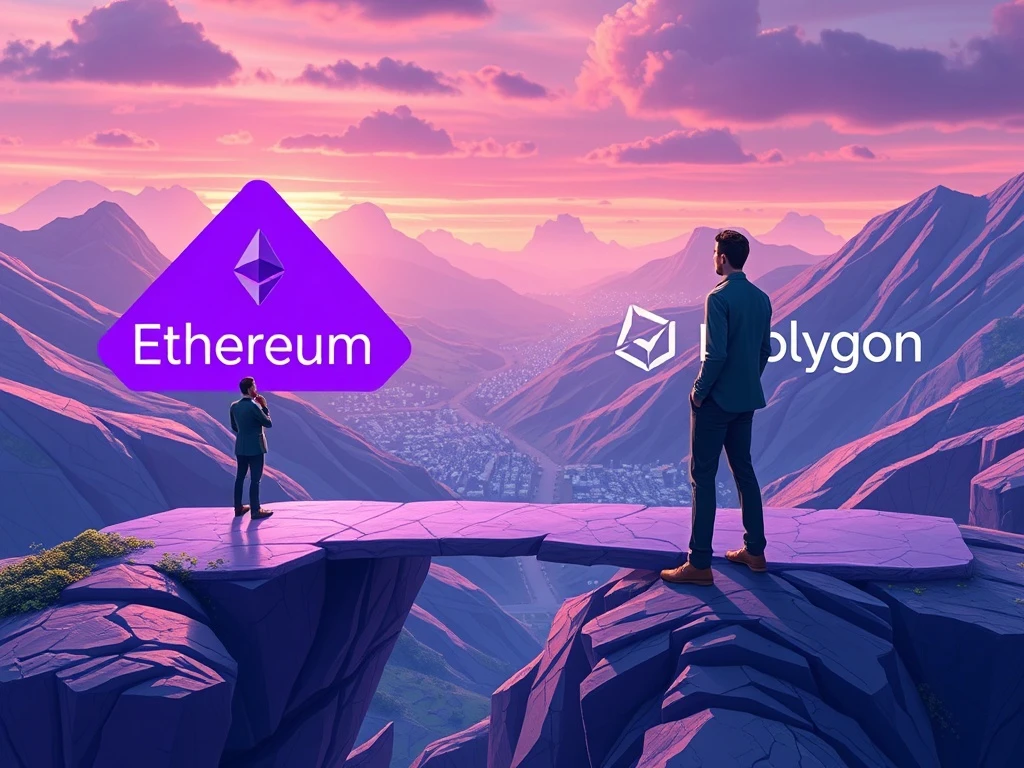Polygon Ethereum Loyalty Questioned: Sandeep Nailwal’s Critical Stance Ignites Debate

A significant debate has emerged within the blockchain space. **Polygon Ethereum** co-founder Sandeep Nailwal recently voiced strong frustrations. He questioned his loyalty toward Ethereum, igniting a widespread discussion across the **crypto community**. This pivotal moment highlights underlying tensions and differing views on collaboration within the ecosystem.
Sandeep Nailwal’s Candid Critique of the Ethereum Community
Brayden Lindrea reported on this unfolding story. Polygon’s Sandeep Nailwal openly criticized the Ethereum community. He believes they undervalue Polygon’s crucial role. This sentiment prompted a direct response from Ethereum co-founder **Vitalik Buterin**. Nailwal, also the Polygon Foundation’s CEO, stated he is now “questioning his loyalty” to Ethereum. He specifically pointed to the Ethereum Foundation and its community. According to Nailwal, Polygon has received no direct support.
He expressed his views in a recent post on X. Nailwal suggested the opposite has occurred. He asserted his loyalty to Ethereum may have cost Polygon billions in valuation. This decision meant not branding Polygon as a standalone Layer 1 network. Nailwal declared, “The Ethereum community as a whole has been a shit show for quite some time.” He urged the community to self-reflect.
Moreover, Nailwal is not alone in his criticism. Other industry leaders have also voiced concerns about the Ethereum Foundation. This foundation has seen major leadership changes over the past year. Nailwal referenced a post from former EF researcher Péter Szilágyi. Szilágyi had shared an 18-month-old letter detailing his frustrations. Additionally, Eric Conner, an early Ethereum developer, departed in January. He cited concerns regarding Buterin’s leadership choices.
Vitalik Buterin Acknowledges Polygon’s Contributions
Nailwal’s post quickly garnered attention. It prompted a thoughtful response from **Vitalik Buterin**. Buterin acknowledged Polygon’s significant achievements within the broader Ethereum ecosystem. He highlighted several key contributions Polygon has made:
- It hosts Polymarket, the largest predictions market platform.
- Polygon has significantly advanced zk-EVM technology.
- Its infrastructure supports various decentralized applications.
Buterin also personally praised Nailwal’s philanthropic efforts. He specifically mentioned CryptoRelief. This initiative has funded biomedical infrastructure and research in India. This recognition from Buterin offered a conciliatory tone to the heated discussion. It underscored the complex relationship between these major blockchain players.
The Ongoing Debate: Is Polygon a True Ethereum Layer 2?
Despite the praise, Buterin maintained a crucial distinction. He noted that Polygon still lacks a proof system. This system is essential for achieving the full security guarantees expected from true **Ethereum Layer 2** solutions. Nailwal had claimed Polygon wasn’t treated as a Layer 2. Buterin’s point directly addressed this assertion.
However, Buterin also offered a clear path forward. He suggested Polygon could easily adopt an existing “ZK tech stack.” This would enable the necessary proof system. He emphasized that this technology has become highly efficient. Proving costs are now as low as $0.0001 per transaction. This technical guidance indicates a potential resolution for Polygon to fully align with Ethereum’s security model. The conversation highlighted the technical nuances defining Layer 2 solutions.
Source: Vitalik Buterin
Broader Crypto Community Reactions and Future Outlook
The debate extended beyond Ethereum’s core figures. **Sandeep Nailwal** received support from other prominent figures. Solana co-founder Raj Gokal and former Solana Foundation head of strategy Austin Federa weighed in. Both suggested Polygon consider teaming up with Solana. Alternatively, they proposed Polygon could become a Layer 2 on the Ethereum-rival network. This demonstrates the competitive yet collaborative nature of the broader blockchain space.
The discussion underscores critical questions about blockchain interoperability and ecosystem loyalty. Polygon has undeniably contributed significantly to scaling Ethereum. Its innovations have supported numerous dApps and users. The current dialogue, however, pushes for clearer definitions and greater recognition of these efforts. As the blockchain landscape evolves, such open discussions are vital. They help shape the future of decentralized networks and foster stronger collaboration. This ongoing conversation will likely influence future development and strategic partnerships within the **crypto community**.
The outcome of this debate could redefine how various blockchain projects interact. It may also influence how communities perceive their roles within larger ecosystems. Both Polygon and Ethereum continue to drive innovation. Their relationship remains a focal point for the entire industry. This discussion reinforces the dynamic and often challenging path of blockchain development.








